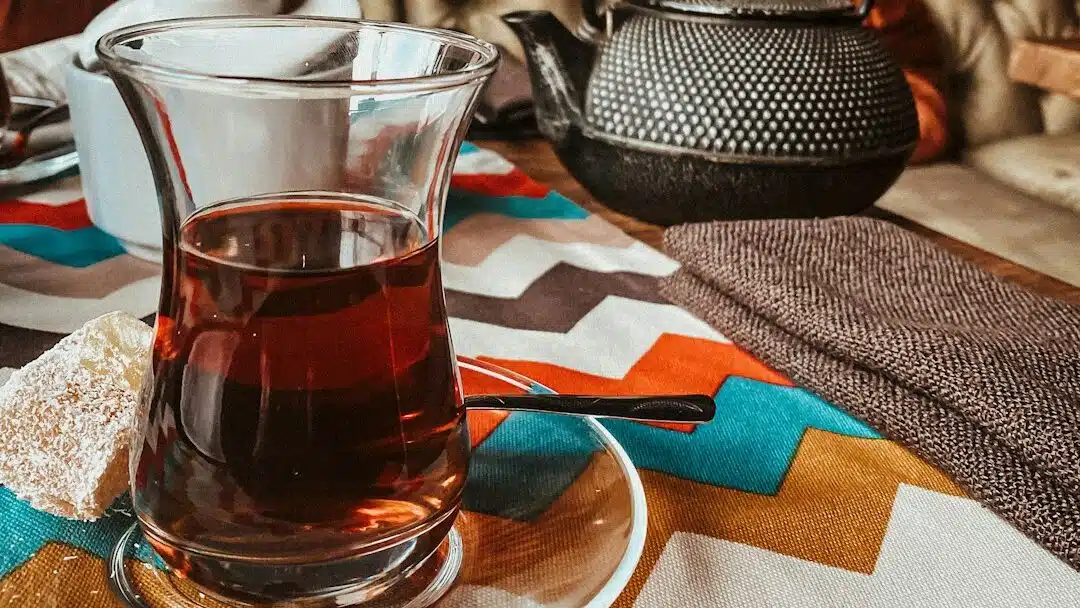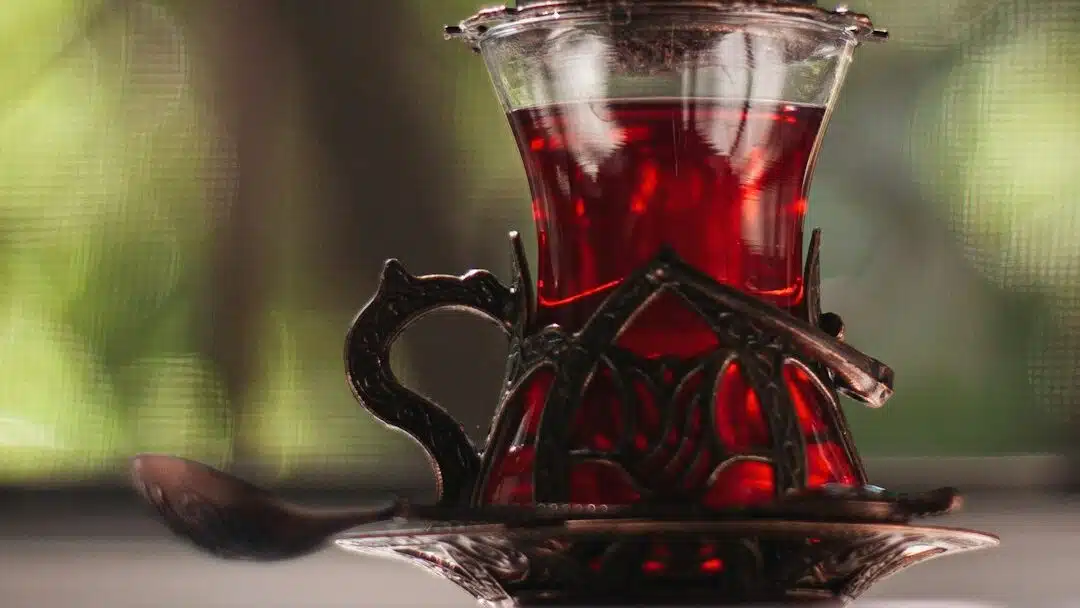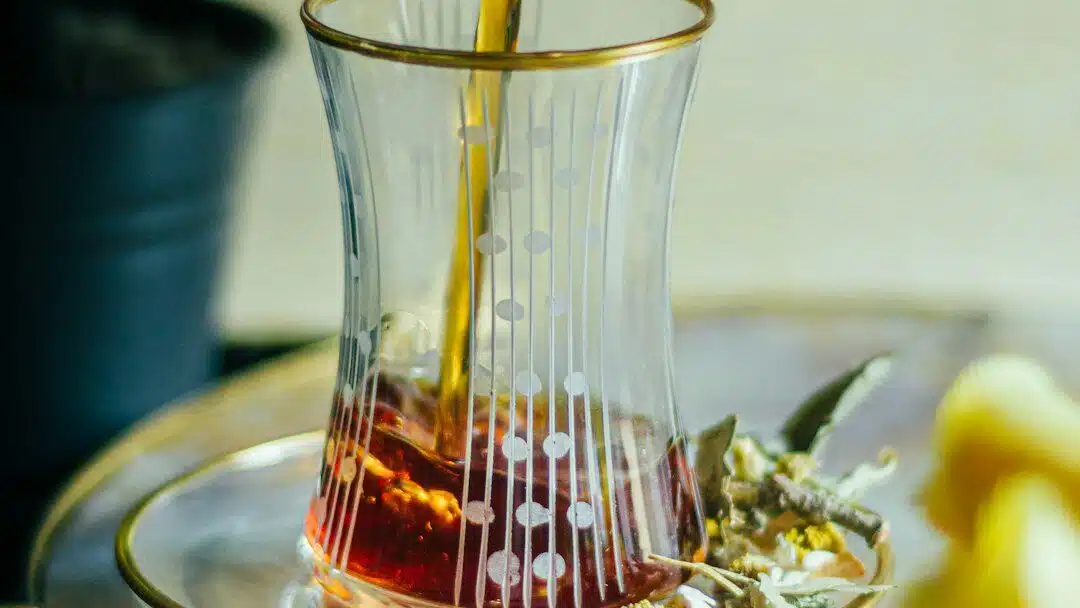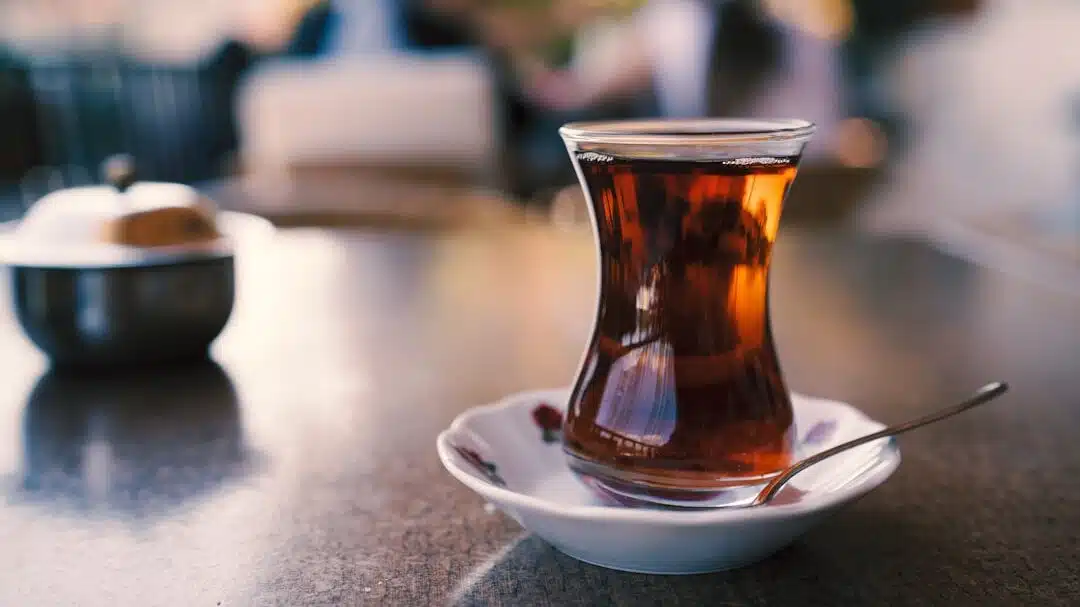Turkish Tea, also known as Turkish Chai is not only a testament to the rich heritage of Turkey but also a bridge that connects people through shared experiences.
This drink plays a pivotal role in the daily lives of many and serves as a reminder of the importance of taking time to connect with others.
Understanding the significance of Turkish Tea can enrich your appreciation for this timeless beverage.
What is Turkish Tea?
Turkish Tea, also known as Turkish Chai, is a type of black tea that is traditionally brewed using a special double teapot called a “çaydanlık.” The tea is served in small, tulip-shaped glasses which enhance its vibrant color and allow you to savor its aroma. Unlike other types of tea, Turkish Tea is usually served without milk but can be sweetened with sugar to taste.
The Unique Preparation Method
The preparation of Turkish Tea is a ritual in itself. The çaydanlık allows you to brew the tea slowly, which releases its full flavor. A small amount of tea leaves are placed in the top pot, while water is boiled in the bottom pot. The hot water is then poured over the tea leaves and left to steep. This method ensures a strong, robust flavor that is characteristic of Turkish Tea.
This method of preparation not only brings out the rich flavors of the tea leaves but also allows for a communal experience as it often involves multiple steps and a level of attention that invites participation. Sharing the preparation of Turkish Tea can be a bonding experience, inviting conversation and collaboration. The careful brewing process is a reflection of the care and attention that goes into making each cup a special moment.
Where to Try It in Istanbul?📍
- Spice Bazaar – Enjoy tea tasting while shopping for exotic spices.
- Grand Bazaar – Traders often offer tea while you browse.
- Princes’ Islands Tour – Sip çay by the sea with a view.
Want to Bring Turkish Tea Home? 🎁
Most local shops and bazaars sell both loose-leaf Turkish tea and çaydanlık sets. Lightweight and affordable, they make excellent souvenirs.
👉 Pro tip: Ask for Rize tea — it’s grown in the Black Sea region and considered the highest quality.
Health Benefits of Turkish Tea
Drinking Turkish Tea offers several health benefits, making it a great addition to your daily routine. The act of drinking tea itself can also serve as a moment of mindfulness, allowing you to pause and enjoy the simple pleasures of life.
Rich in Antioxidants
Turkish Chai is made from black tea leaves, which are rich in antioxidants known as polyphenols. These antioxidants help protect your cells from damage caused by free radicals, potentially reducing the risk of chronic diseases such as heart disease and cancer.
Antioxidants also play a role in supporting your immune system, helping your body to fend off infections and illnesses. The presence of polyphenols in Turkish Tea can contribute to overall well-being and longevity, making it a beneficial part of a healthy lifestyle. Drinking tea regularly can be an easy way to increase your antioxidant intake and support your body’s natural defenses.
Boosts Heart Health
Regular consumption of Turkish Chai may improve heart health. Studies suggest that the flavonoids present in black tea can help lower cholesterol levels and improve the function of blood vessels, reducing the risk of heart disease.
In addition to lowering cholesterol, the flavonoids in Turkish Chai can also improve blood circulation and reduce the risk of stroke. By incorporating Turkish Chai into your daily routine, you can enjoy its heart-protective benefits while savoring its rich flavor. Making small changes, like drinking tea, can contribute to a healthier heart and a longer life.
Aids Digestion
Turkish Tea can also aid digestion. The tea’s tannins can have a calming effect on the digestive system, helping to alleviate digestive issues such as bloating and nausea. Drinking Turkish Chai after meals may promote better digestion and a healthier gut.
The soothing properties of Turkish Tea make it an excellent choice for those looking to improve their digestive health. By calming the digestive tract, this tea can help reduce discomfort and promote regularity. Incorporating Turkish Chai into your post-meal routine can be a simple way to support your digestive system and enhance overall well-being.
Enhances Mental Alertness
The caffeine content in Turkish Tea can enhance mental alertness and concentration. While it contains less caffeine than coffee, it still provides a gentle energy boost, making it an ideal beverage for starting your day or overcoming an afternoon slump.
This moderate caffeine content allows you to enjoy increased focus and productivity without the jitteriness that can come with coffee. Turkish Tea can serve as a balanced alternative for those who are sensitive to caffeine but still want to experience its cognitive benefits. Enjoying a cup of Turkish Tea can help you stay alert and engaged throughout the day.
Supports Oral Health
Drinking Turkish Chai may also support oral health. The polyphenols in black tea can reduce the growth of bacteria responsible for plaque formation, thus promoting healthier teeth and gums.
In addition to reducing plaque, the antibacterial properties of polyphenols may help prevent cavities and freshen breath. By drinking Turkish Chai, you can support oral hygiene and maintain a healthy smile. Incorporating this tea into your routine can be a simple yet effective way to promote dental health.

How to Make Turkish Chai
If you want to experience the authentic taste of Turkish Chai, here’s a simple recipe to follow:
Ingredients
- 1 tablespoon of Turkish tea leaves (or any black tea leaves)
- Water
- Sugar (optional)
Instructions
- Boil Water: Fill the bottom pot of the çaydanlık with water and bring it to a boil.
- Add Tea Leaves: Place the tea leaves in the top pot and pour some of the boiled water over them.
- Steep the Tea: Let the tea steep for about 10-15 minutes.
- Serve: Pour the steeped tea into a small glass until it’s about a third full, then top it up with hot water from the bottom pot. Add sugar if desired.
Tips for Brewing the Best Turkish Chai
- Use fresh, high-quality tea leaves for the best flavor.
- Adjust the steeping time based on your preference for a stronger or milder taste.
- Serve in traditional tulip-shaped glasses to enhance the experience.
To further enhance your Turkish Chai experience, consider experimenting with different types of black tea to find your preferred blend. Paying attention to water quality and temperature can also affect the final taste, so using filtered water and maintaining the right temperature are crucial steps. With practice, you’ll be able to fine-tune your brewing process to create the perfect cup every time.

The Cultural Significance of Turkish Chai
In Turkey, drinking tea is more than just a daily habit; it’s a cultural tradition that brings people together. Whether it’s a family gathering, a business meeting, or a casual get-together with friends, tea is always served. The act of offering tea is a sign of hospitality and friendship, and refusing a cup is considered impolite.
Social Rituals
Tea is often enjoyed in tea gardens, homes, and cafes across Turkey. It’s common to see people engaging in lively conversations over a glass of chai, highlighting the role of tea in fostering social connections.
These social rituals are deeply embedded in Turkish culture, where tea serves as a medium for storytelling, laughter, and the sharing of ideas. The tradition of tea drinking transcends generations, and each cup is an opportunity to strengthen relationships and build community. Turkish Chai is more than just a beverage; it’s a way of life that encourages connection and camaraderie.
A Symbol of Hospitality
Turkish Chai is a symbol of hospitality, often offered to guests as a welcoming gesture. It’s an integral part of Turkish culture and is enjoyed throughout the day, from breakfast to late-night gatherings.
Offering tea to a guest is a gesture of goodwill and friendship, signifying warmth and openness. In many households, the preparation and serving of tea are done with care and attention, reflecting the value placed on hospitality. Embracing the customs associated with Turkish Chai can enrich your understanding of Turkish culture and make you a more gracious host.

🧭 Experience More Local Flavors
Curious about Turkish flavors beyond tea? Don’t miss our guide:
➡️ Turkish Desserts You Must Try
